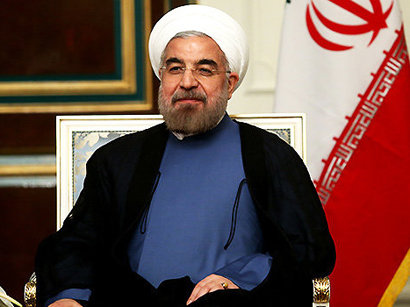Tehran to pursue peaceful nuclear purposes

Iran's President Hassan Rouhani has reaffirmed Tehran's position to continue developing its nuclear energy program for peaceful purposes, Iranian Press TV reported.
"Similar to other nations, the Islamic Republic of Iran considers itself entitled to enjoy all peaceful technologies, including peaceful nuclear technology," Rouhani said in a Monday speech to 130 foreign emissaries in Tehran on the eve of the 35th anniversary of the 1979 Islamic Revolution in Iran.
"Unlike others who want atoms for war, we want atoms for peace. This is why, this [Iranian] administration held serious negotiations with the P5+1 (permanent members of the UN Security Council plus Germany) with complete seriousness to create more confidence for world public opinion," he added.
Iran and the Sextet of world powers signed an interim nuclear deal in Geneva, Switzerland, on November 24, 2013. The two sides started to implement the agreement on January 20 and aim to continue negotiations for a final comprehensive deal later this month.
Under the Geneva agreement, the Sextet agreed to provide Iran with some sanctions relief in exchange for Tehran agreeing to limit certain aspects of its nuclear activities during a six-month period. It was also agreed that no nuclear-related sanctions would be imposed on Iran within the same timeframe.
Rouhani expressed Tehran's preparedness to enter the next round of talks with the Sextet of powers on February 18 in order to achieve a final and comprehensive agreement, noting, "We are serious in this respect as we were in the first step and the doors of our country are open to the [International Atomic Energy] Agency (IAEA)."
The president argued that the Islamic Republic has been a victim of weapons of mass destruction itself and rejected allegations that Iran is after such weapons.
Rouhani also called on the foreign envoys to convey Iran's goodwill message for more cooperation with their countries.
On Sunday, Iran and the IAEA reached an agreement on seven practical measures to be implemented by Tehran as voluntary measures by 15 May 2014. The two sides also reviewed progress on the implementation of the six initial practical measures that were agreed upon some three months ago.
Tehran and the agency signed a joint statement in November 2013 to outline a roadmap on mutual cooperation on certain outstanding nuclear issues. Under the deal, Iran agreed, on a voluntary basis, to allow IAEA inspectors to visit the Arak heavy water plant and the Gachin uranium mine in the south of Iran.
Here we are to serve you with news right now. It does not cost much, but worth your attention.
Choose to support open, independent, quality journalism and subscribe on a monthly basis.
By subscribing to our online newspaper, you can have full digital access to all news, analysis, and much more.
You can also follow AzerNEWS on Twitter @AzerNewsAz or Facebook @AzerNewsNewspaper
Thank you!
